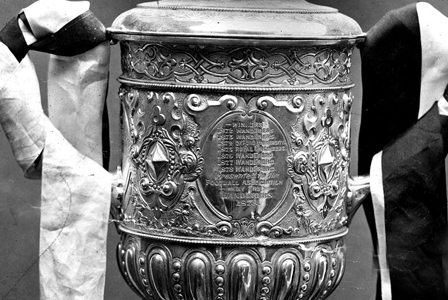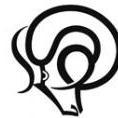So on Monday the 26th of October 1863 The Football Association was formed. The first and therefore oldest football association in the world, often referred to simply as The F.A. and with no 'English' prefix.
Today the F.A. oversees all aspects of the amateur and Professional game and is responsible for the management of the men's, women's, youth and national football teams. It is based at Wembley Stadium, London.
All English professional teams are members of The F.A though it does not control day to day running of The Premier League.
In the early days the F.A's membership (about 50) was quite small and its authority was often challenged or ignored completely. It's main rival in Sheffield had a membership of 26. Throughout the country though, new clubs were being formed, playing F.A.,Sheffield or mixed rules. The game of football was evolving quickly now with formations and tactics gradually being introduced.
On the 20th of July 1871 a meeting was held at the offices of The Sportsman newspaper when Charles Alcock (F.A. Secretary,1870-1895) proposed a knockout competition open to all F.A. member teams, partly in an effort to promote the F.A.
The first ever cup competition however was The Youdan cup held in Sheffield and played under Sheffield rules It was named after and sponsored by Thomas Youdan,a Sheffield theatre owner who provided a trophy and a prize of £2. The final was held at Bramall Lane on the 5th of March 1867 in front of 3000 spectators paying 3d admission and won by Hallam F.C.
The cup was lost until 1997 when Scottish antique dealer contacted Hallam F.C. who subsequently paid £2000 for it.
The F.A cup is the oldest national football association tournament in the world.The first matches were played 11/11/1871 with only 15 clubs entering. There were only 12 matches played in total, with many byes and walkovers and contested by teams from the London area only due to the cost of travel. The final was held at the Kennington Oval, London with 2000 spectators paying 1 shilling.
Wanderers, an amateur team made up mostly of ex public school and university members and founder members of the F.A. beat the Royal Engineers, a British Army team, 1-0. The Royal Engineers were considered favourites but one of their players broke his collar bone and substitutes weren't allowed in those days.
The Royal Engineers were the first football team to 'tour', playing games in Sheffield, Nottingham and Derby in 1873.
The following year 26 Teams entered, though 6 withdrew and Wanderers were given a bye to the final. In the1875/6 season the number of entrants rose to 29. The competition was slowly growing with teams throughout the UK now taking part. One very important factor now was that for a team to take part it had to agree to play under Association rules. The popularity of football as a participation and spectator sport was now becoming evident as by the 1888 final it was watched by 22000 people.
In the 2011/12 season there were 763 teams entered making it the largest such competition in the world.
This is a convenient point to close for now as we have reached the point of my next subject, which will be the formation of the Football League and professionalism.
I've tried to limit the article to the main aspects of the development and history of football and if any member has any questions or comments please feel free to do so on the links below and I will do my best to give a satisfactory response.
In the mean time here are a few random statistics;
Most F.A. Cup Final appearances and wins - Manchester United - 18 apps, 12 wins.
Most appearances in final without winning - Leicester City.
Biggest win in tournament - Preston North End 26 - Hyde (1st round 1887).
Biggest away win in tournament - Clapton 0 - Nottingham Forest 14 (1st round 1891).
Highest attendance - 126,047 Bolton Wanderers v West Ham - Wembley - 28/4/1923.
Preston N. E. achieved the first double (league and cup) beating Wolves 3-0 in 1889.
Notts County have appeared in 2 F.A. cup finals, losing the first on 23/3/1891 3-1 to BLackburn Rovers at The Oval, even though they had beaten Blackburn 7 - 1 only one week previously.
Notts did win the cup, though, on 31/3/1894, beating Bolton wanderers 4 - 1 at Goodison park.Jimmy Logan became the second player to score a hat trick in the final and Notts becoming the first team outside the top division to win having finished 3rd in Division 2.
Henry 'Harry' Cursham scored the most F.A. goals in a career period from 1877-18, a total of 49 goals whilst playing for........Notts.
Biggest cup final score - Bury 6 - Derby County 0.
The Rams had appeared in 2 finals previously, losing 3 - 1 to Nottingham Forest in 1898 (another unwanted statistic) and again losing 4 - 1 to Sheffield United.
The 1945/6 season had no league programme so for the only time in its history the F.A. cup was played over 2 legs up to the semi final and final. In a semi final replay at Maine Road, Manchester, Derby beat Birmingham City 4 - 0 in front of 80,407 spectators, a midweek record attendance between league clubs. The Rams went on to beat Charlton Athletic 4 - 1 after extra time.
So to make up for all the unwanted records I would like to claim that Derby County are the only true winners of the F.A. cup.
Discuss the Series - Super Rams Articles in the Community.
Previous Article | 150 Years of Football







Recommended Comments
Create an account or sign in to comment